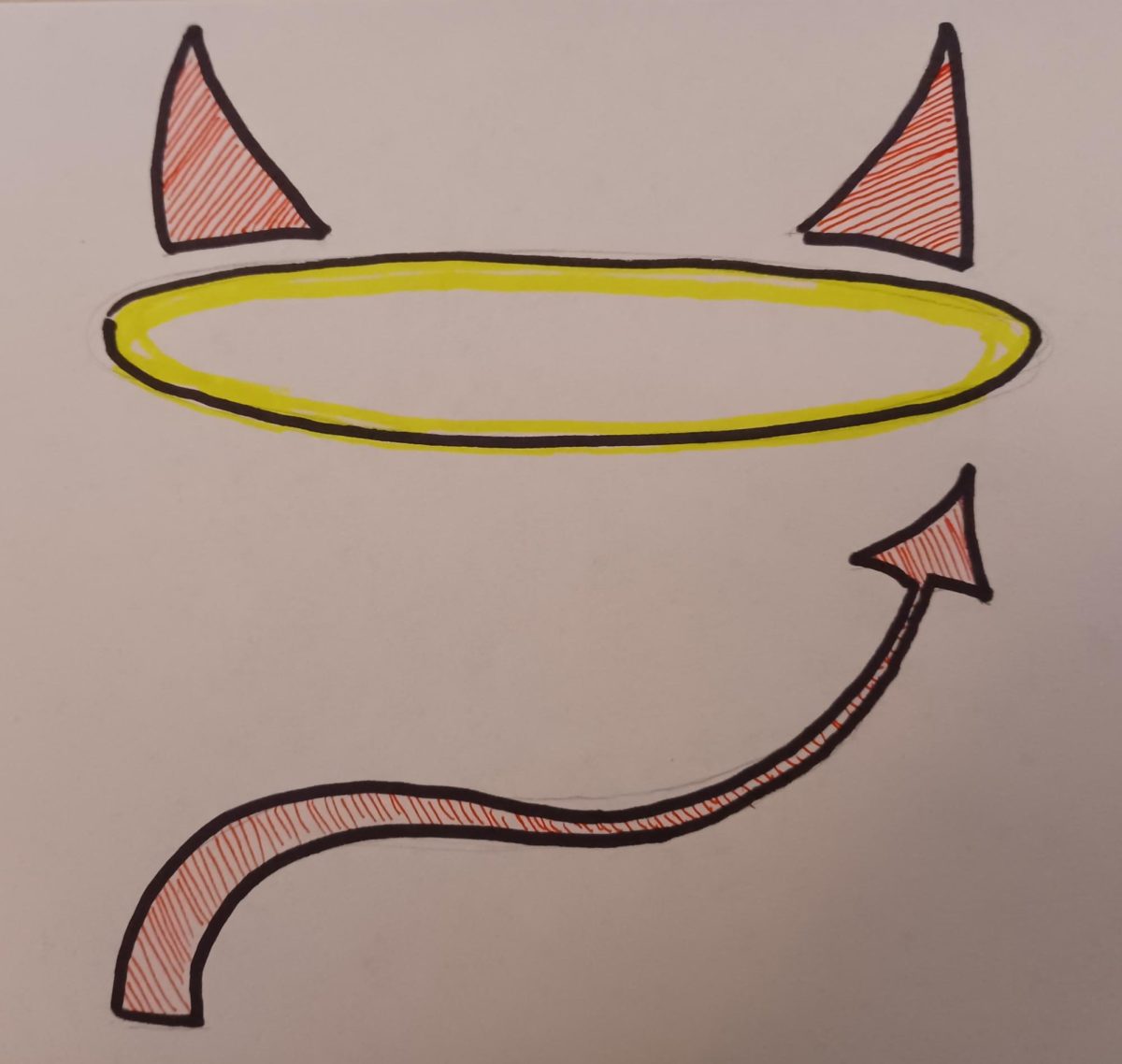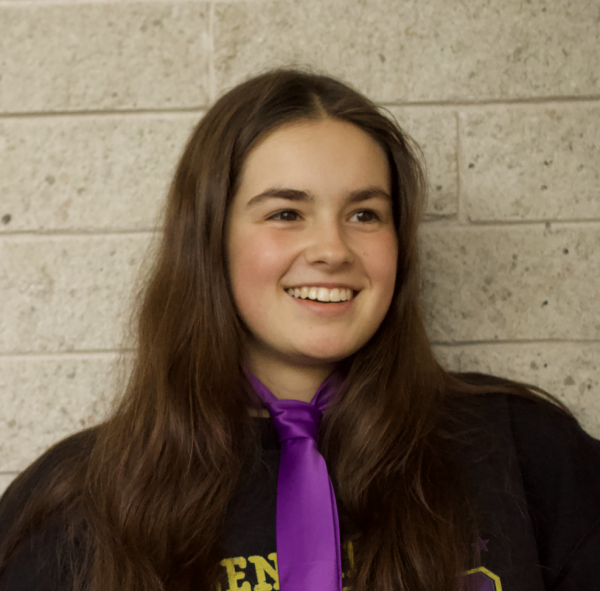Emotional development and maturity is a process that, for most, takes place throughout their entire life. How one is raised is one of the largest factors in how that maturity takes place and over how long. This variation is perfectly exemplified in the show Good Omens which stars Micheal Sheen and David Tennant playing the angel Aziraphale and demon Crowley.
Throughout history angels and demons have been portrayed as moral enemies. Despite this, the two are constantly rotating around each other as they find themselves on common ground attempting to preserve humanity in all its flaws.
While they admire and rely on each other, they both seem to have some deeply rooted denial holding them back from truly connecting. This is the result of their wildly different upbringings and unconscious bias against each other.
Crowley
Why did it take an intervention for Crowley to realize his feelings? Crowley had, on some level, understood that he and Aziraphale had become closer over the thousands of years that had known each other, but it is painfully obvious that despite this closeness, he has never considered that his feelings could be romantic.
Crowley has many instances throughout the show where he brags that hell holds little power over him and his actions. This mentality, however, is not enough to completely banish hell’s way of thinking. This can be seen in almost every aspect of Crowley’s character, he lacks the general filth of his fellow demons but continues to dress in similar colors of black and red, he also mentions many times his being a demon as a kind of excuse as to why he can’t, or rather should not, do something typically regarding Aziraphale.
Despite Crowley’s cool and suave demeanor, hell has a kind of mark on him, something of a shadow. Not quite in the same shackling way heaven has a hold on Aziraphale but it is similarly confining.
His concern lies not with himself, but what hell could do to Aziraphale if they suspected them of having relations. An example of this is Crowley’s choosing to live in his car during season two. Even though living in the bookshop with Aziraphale would be far more comfortable, hell’s ability to track him down makes him fear for Aziraphale’s safety should they be discovered.
This is the same concern that prohibits Crowley from realizing his feelings for Aziraphale on his own. The fear of what could happen to them if they were to engage in a romantic relationship unconsciously hides his feelings away. This is also what causes him to, upon confessing to Aziraphale, request that they run away together saying that “if Gabriel and Beelzebub can do it, go off together, then we can! Just the two of us.”
With this information the question now stands: Why did Crowley accept his feelings with significantly more ease than Aziraphale? In simple terms, it’s not that he came to terms with his feelings faster, it’s that he was able to recognize the content of his actions and put the pieces of the puzzle together faster.
Despite his ability to realize the content of his and Aziraphale’s relationship, Crowley did indeed hold on to his denial for a long time. Throughout the first and second seasons, he is quite touchy and somewhat loving with Aziraphale. Examples of this range from Crowley’s casual leaning towards him to his habitual use of the nickname “Angel.”
These recurring domestic moments allow Crowley to accept the reality of his situation with significantly more ease than his counterpart. The breakage is even further spurred on by large events that hold as points of realization for Crowley.
A scene that falls into this category is when Crowley believes he may have lost Aziraphale among the flames of his bookshop. Despite Crowley having previously displayed his irritation with Aziraphale earlier in the episode, this scene displays Crowley’s true feelings for him and proves that he has grown much more fond of Aziraphale than he ever wanted to admit. The belief that he may have lost Aziraphale overshadows Crowley’s denial and brings his true feelings to light as he shouts to the heavens “Somebody’s killed my best friend!”
A similar example comes when Aziraphale’s bookshop is being threatened by demons. Aziraphale brushes off Crowley’s concerns in turn for a dance with him. Crowley is so blinded by his concern for Aziraphale that he fails to see the tender moment, once again completely brushing his own feelings aside.
Being a demon, Crowley was always meant to have a certain hatred towards angels or at the very least avoid them so as to not make contact with the ‘good’ side. This drives Crowley to keep the two sides of his life [Aziraphale and his demonhood] separated from one another. He continually displays this as any time there may be a threat from hell, Crowley’s first instinct is to protect Aziraphale by keeping him away from the demons entirely.
Crowley’s pattern of actions is what inevitably leads him to the sudden willingness to accept ideas he would have once considered ridiculous. Following that realization comes the burning, uncontrollable desire to be with Aziraphale. This longing for the angel intertwines with his longing to finally find a life where he knows he and Aziraphale can be happy. But for Aziraphale, this idea is overwhelmingly sudden and the rush leaves Aziraphale on the side of heaven and Crowley exactly where he always wanted to be: on his own side.
Aziraphale
Possibly the ultimate moment of denial and pain on Aziraphale’s part was the moment when he was forced to choose to either stay with Crowley, his best friend, or go to heaven, which was his entire life’s purpose.
This moment of moral argument held the audience captive as they watched to see if Aziraphale could overcome the influence of heaven to stay on earth. He couldn’t. Why, after all the years he spent with Crowley, was he still willing to go to heaven and leave his bookshop and Crowley in his wake?
Because he was raised for millennia to believe that his value was only that of heaven, Aziraphale relies completely on the validation of those around him to know that he is doing the right thing and we have seen this throughout the series.
In season one, he found out that the antichrist was alive, and instead of doing what he thought was right, he first went to heaven and asked them what he should do. Before he makes decisions he almost always wants to confer with God or Gabriel and make sure that he is doing what Heaven wants.
It makes sense that once he grows into this pattern he feels like he cannot do anything without explicit instructions to do so from heaven and thus, when he was asked to go back to heaven he could not say no.
This constant need for validation combined with the anxiety associated with personal connection is a motif that Aziraphale battles throughout the show and that many viewers can connect to.
In making a show with characters who struggle with many human emotions and problems, the producers created a place for fans to see reflections of the world around them.
Aziraphale value lies in sacrifice no matter how much he wants to prioritize Crowley and the life they have built. He sacrificed his sword for Adam and Eve, his freedom to serve God, and his love to change the world. To Aziraphale the idea of putting himself before anything else is unthinkable and would be going against his status as an angel.
Science says that while denial is difficult to recognize and overcome, time does lend itself to help out. Aziraphale, while he doesn’t know he is in denial, does seem to recognize that he needs more time to understand everything going on between him and Crowley. Multiple times in the show he says things like, “You go too fast for me Crowley” which seems trivial at the moment but contains a much deeper issue.
Aziraphale is scared of connection because not only does he feel unworthy, he believes that it is his job to bring joy to others and not to himself as he has been taught by heaven all his life. He knows he needs Crowley and says as much in the last episode but he is unwilling to fight for Crowley because he still has faith in heaven.
Upbringing holds a large role in the development and decisions we as humans and consequently the media make to depict our society.
It’s debated among fans whether or not Crowley and Aziraphale would have come to realize their feelings for each other had the Metatron not separated them. Their relationship has always been complex for both the characters themselves and fans of the show, and fans continue to hope that they will eventually come to terms with their feelings and “be a group of the two of [them]” -Crowley.
Denial and overwhelming internal arguments such as these are difficult to overcome and can impact all aspects of one’s life; however, viewers have faith that, once these beloved characters give themselves time and honesty, they will be able to overcome these long-term struggles. Announcing a third season to the show has fanned the flames of this hope beautifully, and it seems likely that season three will do well to feature their reunion and let them finally be happy.
Connecting the audience to the characters gave the producers the ability to create a relatable and honest show that highlighted the challenges of being, or rather becoming, human. Neither Crowley nor Azirphale wants to be alone, but being alone together poses a far greater terror: the threat of attachment, of abandonment, of love.





